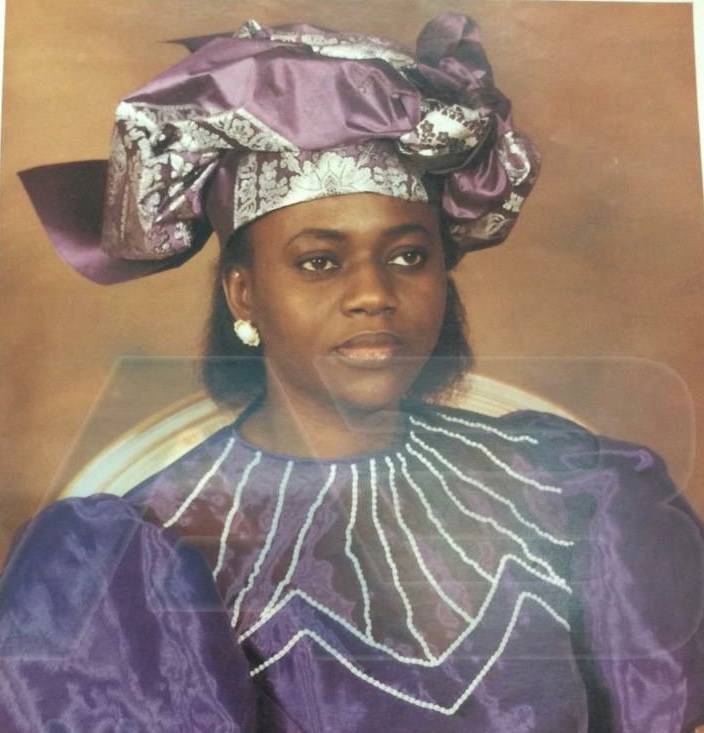News
Maryam Babangida: Nigeria’s Most Iconic First Lady, 10 Years After Death

Friday December 27, 2019, marks the tenth year memorial of Maryam Ndidi Babangida, the wife of former military president, Ibrahim Badamosi Babangida. The iconic first lady died of ovarian cancer, which she battled for 10 years, at the University of California’s Jonsson Comprehensive Cancer Centre, Los Angeles, United States of America.
She was aged 61.
Although, Babangida, Nigeria’s military president for eight years, is hardly the nation’s most popular political figure, his wife, Maryam, was a woman who attracted a flood of admiration during her lifetime. Ten years after her death, her endearing legacies are still speaking in the hearts of many Nigerians. For indeed, she turned heads with her beauty and elegance; and she elevated the position of the first lady with her visibility and glamour.
On many aspects of Maryam’s public persona, the Nigerian public was united. On others, it was less so. Her beauty provoked no debate, just as her elegance was a subject of consensus. She was a head turner. Similarly, there is unlikely to be a challenge to her position as first Nigerian woman to use her spousal position to play prominent role in public life and elevate the position of the first lady to an institution of sort. Prior to her becoming first lady, women played only a marginal role in Nigeria’s public life.
The public profile of women changed greatly with the coming into power of her husband, who toppled General Mohammadu Buhari in 1985. She opened an office for herself in the presidency when her husband became president.
In 1987, two years into her husband’s military presidency, she launched the Better Life for Rural Women Programme (BLP), which incorporated the wives of all senior state officials. Wives of military governors in the various states became chairpersons of the state chapters of the BLP, with the wives of local government chairpersons at the third tier of government. Considerable state resources were provided for the BLP, both officially and unofficially.
Government funding of BLP nudged the late activist lawyer, Chief Gani Fawehinmi, to sue the BLP and its officials for spending public funds for private purposes. The action forces the BLP to look for other sources of funds for its activities.
The usefulness or otherwise of the BLP will forever be a subject of debate. The programme claimed to have improved the lot of rural women, including the establishment of 10,000 co-operative societies, 1,793 cottage industries, 2,397 farms, 470 women centres and 233 health centres.
Maryam had her own fan club, which credited her with outstanding accomplishments as President, Nigerian Army Officers’ Wives Association, NAOWA, and as BLP chairperson. Her admirers describe her as kind. She was said to be in the habit of personally distributing essential commodities to junior officers’ wives and asking after their welfare. The late first lady was described as a great woman, who taught most women how to be self-sufficient. She empowered and liberated women by bringing them out of their cocoon. A lot of men didn’t like the fact that she gave confidence to women.
Some of the late first lady’s close associates will readily describe her as one woman with a good heart, and one who was always concerned about the welfare of women and children. She was also reputed to have brought respect and glamour to the office of the first lady.
To many of her close associates, Maryam was not just a friend. She was their sister and confidant. They called her Madam, and she was the only woman they dignified with that title. The late first lady was said to be extremely great at organising things and people, and was also admired for her excellent administrative qualities. A great lover of nature and bird, Maryam was described as being very warm and one who never looked down on anybody.
To most other Nigerian women, Maryam will always be fondly remembered for bringing respect and dignity to womanhood. She gave confidence to rural women and encouraged them to contribute to the development of the nation. Of course, she had the support of her husband, but she used her office to impact on lives.
Maryam (nee Odogwu) was born in November 1, 1948 in Asaba, Delta State, where she started her education before moving to Kaduna, where she attended Queen Amina College. She went on to train as a secretary at the Federal Training Centre, Kaduna, and later obtained a Diploma in Secretarial Studies from Laselle University, Chicago, USA. She also earned a certificate in Computer Science from the NCR Institute in Lagos. On September 6, 1969, two months before her 21st birthday, Maryam married Ibrahim Badamasi Babangida (then a Major), with whom she had four children – Aisha, Mohammed, Aminu and Halima.
After her husband left office, Maryam moved into business. She established a bakery and a school among other things. The school, El-Amin International School, is cited in Minna, Niger State.
-
Society News3 years ago
Jamaican man beheads wife after finding out their 6 kids are not his
-
Society News5 years ago
EXCLUSIVE: The Complete Story of Dolapo Awosika, John Fashanu and Prophet Kasali Sex Mess
-
News2 years ago
Breaking: Ex-Police IG, Tafa Balogun Dies
-
News4 years ago
Pastor Osagie Ize-Iyamu, His Membership Of Secret Cult, And Other Issues Touching On His Public Credentials Examined by Barr. PATRICK I. BIOSE
-
News4 years ago
BREAKING: Ajimobi’s daughter-in-law blast Gov. Makinde, says gov can’t surpass ex-Oyo gov
-
News4 years ago
BREAKING: 2 arrested as NAF begins investigations into Tolulope’s death
-
News4 years ago
BREAKING: Police take over Edo House of Assembly as APC, Oshiomhole move to seize control
-
Crime4 years ago
Exclusive: Female Aide Fingered In Oko Oloyun’s Murder + Banking Transactions That Nailed Husband
Notice: Undefined variable: user_ID in /var/www/first2023/wp-content/themes/firstweekly/comments.php on line 48
You must be logged in to post a comment Login